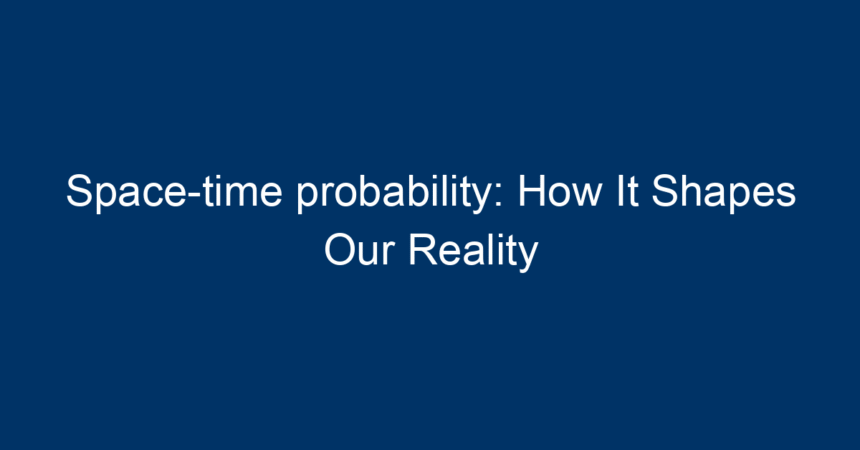In the realm of physics and philosophy, few concepts are as intriguing and complex as space-time probability. This term encapsulates the interactions between the dimensions of space and time, as well as the probabilistic nature of reality itself. While it may seem like an abstract concept reserved for theoretical physicists, space-time probability influences everything from the tiniest particles in our universe to our day-to-day decision-making. In this article, we’ll explore the depths of space-time probability, how it shapes our reality, and what it means for the future of science and humanity.
Understanding Space-Time and Probability
The Basics of Space-Time
Space-time is a four-dimensional continuum that merges the three dimensions of space (length, width, height) with time as the fourth dimension. This concept was popularized by Albert Einstein in his theory of relativity. According to relativity, the fabric of the universe is intertwined; events are not isolated but occur in a continuous flow where the position affects the time and vice versa.
Delving into Probability
Probability, at its core, is the measure of the likelihood that a certain event will occur. In statistical terms, it ranges from 0 (impossible) to 1 (certain). The fascinating interplay between space, time, and probability leads to profound implications for how we perceive the universe and make choices.
The Intersection of Space-Time and Probability
When we discuss space-time probability, we’re looking at the likelihood of events occurring at different points in time and space. For instance, the probability of finding a particle in a specific location at a particular time involves understanding not only quantum mechanics but also the fabric of space-time itself.
The Role of Space-Time Probability in Physics
Quantum Mechanics and Uncertainty
One of the key areas where space-time probability plays a pivotal role is in quantum mechanics. The famous Heisenberg Uncertainty Principle states that the more precisely we know the position of a particle, the less precisely we can know its momentum, and vice versa. This uncertainty is fundamentally probabilistic, shaping our understanding of reality at the smallest scales.
General Relativity and Cosmic Scales
On a larger scale, general relativity shows us how mass and energy warp space-time. This curvature influences how matter moves and interacts, creating probabilities around trajectories of celestial objects. Astrophysicists use space-time probability models to predict the paths of stars, planets, and even light under the influence of gravity.
The Cosmic Microwave Background
The cosmic microwave background (CMB) radiation is another realm where space-time probability plays a critical role. The CMB provides insights into the early universe’s conditions and allows scientists to calculate the probabilities of different cosmological models. By understanding variations in the CMB, researchers can infer the most likely scenarios about the universe’s evolution.
Space-Time Probability in Everyday Life
Decision-Making Under Uncertainty
On a micro-level, space-time probability impacts our daily lives through decision-making processes. Every choice we make is influenced by probabilities, whether they involve personal finances, health, or even social interactions. For example, consider a simple decision like choosing whether to carry an umbrella based on the probability of rain.
Time Management and Opportunity Cost
When planning our schedules, we often weigh the probabilities of various outcomes. Understanding the likelihood of certain activities being successful or whether they will lead to desired results helps us allocate our time more effectively. This concept of opportunity cost also relates to space-time probability, as every time we make a choice, we are, in effect, navigating through a multidimensional landscape of possibilities.
Perceptions of Reality and Free Will
The philosophical implications of space-time probability extend to considerations of free will and determinism. If the universe operates on probabilistic laws, does that mean our choices are predetermined by the fabric of space-time? This question has profound implications for ethics and personal responsibility, challenging us to rethink our understanding of autonomy in a probabilistic universe.
Applications of Space-Time Probability in Technology
Artificial Intelligence and Machine Learning
One of the most practical applications of space-time probability can be found in artificial intelligence (AI) and machine learning. AI algorithms often rely on probabilistic models to predict outcomes based on historical data. For example, recommendation systems use space-time data to suggest products or content tailored to individual preferences.
Climate Modeling
Climate scientists utilize space-time probability to create models that predict future weather patterns. By analyzing historical data over specific periods and locations, researchers can develop probabilistic forecasts that help us prepare for impending climate changes.
Financial Markets
In finance, space-time probability is crucial for assessing risk and forecasting market trends. Investors employ probabilistic models to analyze data, helping them make informed decisions regarding buying or selling assets.
The Future of Space-Time Probability Research
The exploration of space-time probability is ongoing, and it poses exciting questions for future research. Here are some areas to watch:
Quantum Computing
Quantum computing relies on principles of quantum mechanics and, inherently, probabilities. Researchers aim to harness quantum states for solving complex calculations that are impractical for classical computers. The intersection of space-time and quantum computing may unlock new methodologies for tackling problems across various fields.
Gravitational Waves
The detection of gravitational waves has opened a new window for studying the cosmos. By analyzing these ripples in space-time, scientists can improve probabilistic models of the universe’s behavior, enhancing our understanding of black holes and fundamental physics.
The Philosophy of Space-Time
As science advances, so too does the philosophical understanding of space-time probability. Questions surrounding the nature of reality, consciousness, and our place in the universe will continue to unfold as researchers deepen their exploration of these topics.
Conclusion: Embracing the Power of Space-Time Probability
Space-time probability shapes our understanding of the universe and influences our everyday decisions. From quantum mechanics to artificial intelligence, recognizing the interplay between space, time, and probability allows us to harness this knowledge into actionable insights.
Actionable Insights
-
Educate Yourself: Delve deeper into the concepts of quantum mechanics and relativity. Resources such as books, online courses, and documentaries can expand your understanding.
-
Reflect on Decision-Making: Consider the probabilities associated with your decisions in daily life. This reflection can enhance your understanding of unavoidable uncertainties and inform better choices.
-
Explore Technological Applications: Investigate how industries around you are utilizing space-time probability. Understanding these applications can provide insight into future trends.
- Stay Curious: Continue to engage with the latest research and theories surrounding space-time probability. This field is evolving, and staying informed can benefit your personal and professional life.
In conclusion, space-time probability doesn’t just belong to theoretical discussions; it’s woven into the very fabric of our reality and experiences. Understanding these concepts can provide us with valuable tools to navigate our lives more thoughtfully and effectively.




